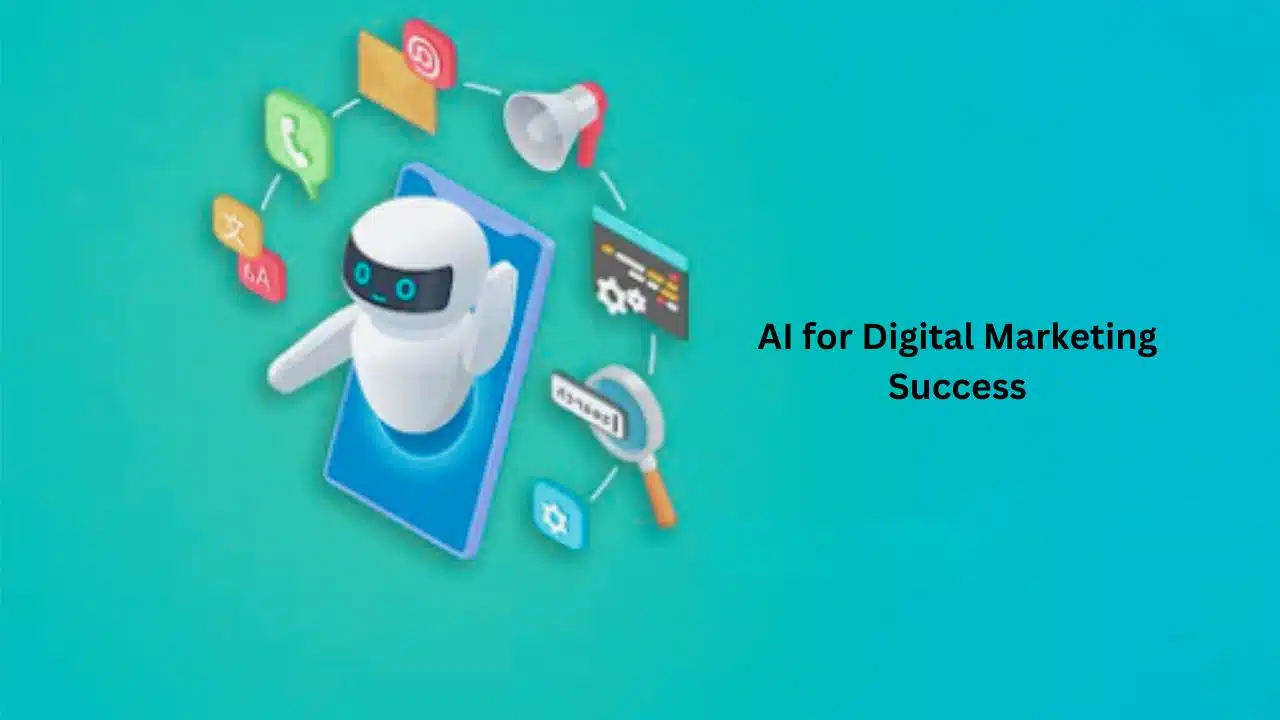Staying ahead of the competition requires innovative and efficient strategies in today’s fast-paced digital world. One of the most transformative technologies reshaping digital marketing is artificial intelligence (AI). AI can revolutionize how marketers interact with customers, optimize campaigns, and analyze data.
By leveraging AI, businesses can enhance their marketing efforts, improve customer experiences, and achieve higher returns on investment.
This article explores the top 10 ways to use AI in your digital marketing strategy, providing detailed insights and practical examples. Whether you’re looking to streamline operations, personalize interactions, or gain deeper insights into customer behavior, AI can be a powerful marketing toolkit.
1. Data Analytics
AI has significantly transformed data analytics by enabling marketers to process and analyze vast amounts of data quickly and accurately. Traditional data analysis methods can be time-consuming and prone to human error.
In contrast, AI algorithms can swiftly sift through data from various sources, such as social media, website analytics, and customer interactions, to identify trends and insights. This ability to streamline data analysis allows marketers to make informed decisions and develop strategies based on real-time data.
AI can also predict future trends by identifying patterns, which helps businesses stay ahead of competitors and adapt to changing market conditions. By providing a comprehensive overview of performance metrics, AI-powered data analytics tools empower marketers to allocate resources more effectively and optimize their campaigns for better results.
2. Content Creation
Creating engaging content is a cornerstone of any successful digital marketing strategy. AI can assist in generating various types of content, including blog posts, social media updates, email newsletters, and video scripts.
Tools like ChatGPT and Jasper can produce high-quality content quickly, saving marketers valuable time and ensuring consistency across all marketing materials. While AI-generated content provides a solid starting point, human creativity is essential for refining and personalizing the content to align with the brand voice and style.
This combination of AI efficiency and human creativity leads to high-quality, engaging content that resonates with the target audience. Additionally, AI can analyze audience preferences and suggest content topics, ensuring the material is relevant and timely.
3. Reducing Admin Work
AI can significantly reduce the administrative burden on marketers by automating routine tasks, saving time, and allowing marketers to focus on more strategic activities. AI tools can handle scheduling meetings, summarizing articles, taking notes, and managing emails.
For example, AI-powered email clients like Superhuman can draft replies, summarize threads, and perform fast searches, increasing productivity and efficiency. By automating these repetitive tasks, AI frees marketers to concentrate on strategy development and creative work.
This enhanced productivity can lead to improved campaign performance and higher ROI, as marketers can devote more time and energy to activities that directly impact business growth.
4. Content Personalization
Personalized content is more likely to engage customers and drive conversions. AI enables marketers to create highly customized content based on user behavior, preferences, and demographics.
By analyzing data from various touchpoints, AI can deliver tailored marketing messages that resonate with individual customers, enhancing engagement and satisfaction. Dynamic content that adjusts based on user behavior can significantly boost engagement, making interactions more relevant to each user.
This level of personalization enhances customer experiences, leading to increased loyalty and higher conversion rates. AI-driven personalization can be applied across various channels, including web pages, emails, and social media posts, ensuring a consistent and cohesive customer journey.
5. Media Buying
AI can optimize media buying by selecting the most effective ad placements and bidding strategies, ensuring that marketing budgets are used efficiently. AI algorithms analyze real-time performance data to adjust bids and placements, maximizing the return on ad spend (ROAS).
This optimization leads to more effective advertising campaigns, as AI can identify the best times and places to display ads based on user behavior and preferences. By automating the media buying process, AI helps marketers achieve better results with less effort, leading to higher ROI and more effective use of marketing budgets.
Additionally, AI can predict the success of different ad creatives, allowing marketers to make data-driven decisions about which ads to run.
6. Chatbots
AI-powered chatbots enhance customer support by providing instant responses and personalized interactions, improving overall customer experience. Chatbots use natural language processing (NLP) to understand and respond to customer inquiries, handling various tasks, from answering common questions to assisting with transactions.
Chatbots improve customer satisfaction and loyalty by offering quick and accurate responses, ensuring that customers receive timely support. This enhances the customer experience and frees up human agents to handle more complex issues.
AI chatbots can be integrated across various platforms, including websites, social media, and messaging apps, providing consistent and efficient support around the clock.
7. Automated Email Marketing Campaigns
Automated email marketing campaigns driven by AI can boost engagement and conversions by delivering personalized and timely messages. AI tools can automate various aspects of email marketing, from content creation to list segmentation.
This automation allows marketers to focus on strategy and creativity while AI handles the repetitive tasks. Personalized email campaigns tailored to individual preferences and behaviors are likelier to engage recipients, leading to higher open rates, click-through rates, and conversions.
AI can also analyze past email performance to optimize future campaigns, ensuring that each email sent is as effective as possible. By leveraging AI in email marketing, businesses can build stronger relationships with their audience and drive better results.
8. Predicting Customer Behavior
AI can forecast customer behavior and sales trends, enabling marketers to develop more effective campaigns and make informed decisions. AI can predict customer actions, such as purchasing or churn, by analyzing historical data and market conditions.
This helps marketers create targeted campaigns that drive results, as they can tailor their messaging and offers to meet their audience’s predicted needs and preferences.
Understanding customer preferences and predicting future actions allows marketers to craft more effective strategies, leading to higher conversion rates and better ROI. AI-driven predictive analytics can also help businesses identify potential opportunities and threats, allowing them to respond proactively.
9. Improving Customer Experience
AI enhances customer experiences by delivering personalized interactions across various touchpoints, improving retention and loyalty. AI enables marketers to tailor interactions based on individual customer data, providing relevant and timely content.
This personalization enhances customer satisfaction and engagement, increasing retention and loyalty. Satisfied customers are more likely to return and recommend the brand to others, driving long-term business growth.
AI can also help identify pain points in the customer journey and suggest improvements, ensuring a seamless and enjoyable customer experience. By leveraging AI to enhance customer experiences, businesses can build stronger relationships and drive higher lifetime value.
10. Social Media Management
Managing social media accounts can be time-consuming, requiring constant attention to detail and regular content updates. AI can significantly streamline social media management by automating content scheduling, analyzing engagement metrics, and generating content ideas.
Tools like Buffer, Hootsuite, and Sprout Social use AI to determine the best times to post content for maximum engagement, analyze which types of posts perform best, and provide insights into audience demographics and behavior.
One of the most powerful features of AI in social media management is sentiment analysis. AI can gauge the overall sentiment toward a brand by analyzing comments, mentions, and direct messages.
This allows marketers to respond promptly to negative feedback, address customer concerns, and capitalize on positive trends. AI-driven sentiment analysis helps brands maintain a positive online reputation and build stronger relationships with their audience.
Additionally, AI can help identify influencers and brand advocates by analyzing engagement patterns and identifying individuals who frequently interact with the brand. This can lead to more effective influencer marketing campaigns, as brands can partner with influencers genuinely interested in and supportive of their products or services.
AI Marketing Pros and Cons
While AI offers numerous benefits, it also presents some challenges. Understanding the pros and cons of AI in digital marketing is crucial for effective implementation.
Pro:
1. Increased ROI:
AI optimizes marketing efforts, leading to higher returns on investment.
2. Speed and Efficiency:
AI automates repetitive tasks, saving time and boosting productivity.
3. Better Customer Experience:
AI delivers personalized interactions that enhance customer satisfaction.
4. Data-Based Decisions:
AI provides data-driven insights that inform marketing strategies.
Cons:
1. Content Quality and Accuracy:
AI-generated content may require human oversight to ensure quality and accuracy.
2. Privacy Concerns:
Using AI for personalization involves handling sensitive customer data and raising privacy issues.
3. Copyright Issues:
AI-generated content can raise questions about authorship and intellectual property.
Wrap up
Incorporating AI into your digital marketing strategy can revolutionize how you engage with customers, optimize campaigns, and analyze data. From enhancing customer experiences with personalized content to streamlining administrative tasks and improving social media management, AI offers many benefits that can drive your marketing efforts to new heights.
While there are challenges and ethical considerations to remember, the advantages of leveraging AI far outweigh the drawbacks. By staying informed about the latest AI tools and techniques and integrating them thoughtfully into your marketing strategy, you can stay ahead of the competition and achieve remarkable results.
As AI technology evolves, it’s crucial to remain adaptable and open to new possibilities. Embrace the power of AI to enhance your digital marketing strategy, and you’ll be well-positioned to meet the ever-changing demands of the digital landscape.





































